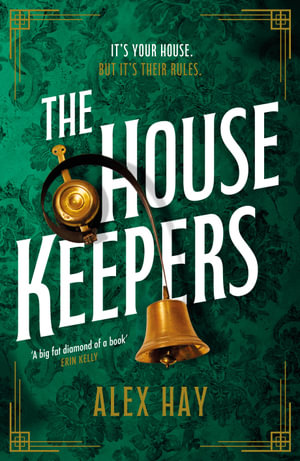The housekeepers by Alex Hay

The new, sumptuous mansion in Park Lane London is the height of 1905 modernity, packed with every luxury imaginable, the home of the de Vries family, built with money from their diamond business and it is stuffed with artworks and objets d’art. The house comes with a well-trained staff to keep it running smoothly including Mrs King, the housekeeper, Mr Shepherd the butler, and there are maids, manservants, housemaids, the cook, chauffeur and groomsman. But all is not well, the master has died, his daughter is planning a ball and the housekeeper has been dismissed after being found in the men's quarters. Now in charge of the mansion, Miss de Vries (mama died when she was young) is in search of a marriage alliance and tasks her lawyer with finding a suitably blue-blooded husband for her as she plans her ball, a sumptuous affair to catch the world’s attention albeit while she is dressed in mourning black. Meanwhile Dinah, aka Mrs King is doing a lot of planning herself. It seems Mr de Vries, real name Danny O’Flynn, was not only Dinah’s father but he also has a sister, Mrs Bone whose pawn shop is the centre of her own underworld empire. Mrs Bone too has a score to settle, having lent Danny the money to set up his diamond business, and is open to Dinah’s audacious plan to settle the score. They plan a magnificent heist, stripping the mansion entirely during the ball and pre-selling the contents on the black market. As the days are counted down, intricate arrangements are made to infiltrate the house servants and guest list. They carefully plan the operation, bringing in specialist help like the twin trapeze artists called Jane, the flamboyant actress, Hepzibah and the talented and ambitious seamstress Alice, also a relative, keen for her share to pay off unscrupulous loan sharks. There is great dialogue, often with an undercurrent of private understanding, and wonderfully described characters such as Mr Shepherd the butler, who smelled of grease and gentleman’s musk, “was like an eel, heavy and vicious, and he moved fast when he wanted to” p3 or Mr Lockwood “the lawyer seemed smooth, but he only seemed it. Really he was serrated all over, knicked and ridged from top to toe and you could prick yourself if you got too close” p13. But there are so many characters and sub-plots the story falters and loses pace. The much-anticipated ball eventually arrives but by then it seems less like a well-oiled plot than a farce and winding up the multiple sub plots means the ending fizzles out. First time author Alex Hay draws on his extensive knowledge of the era with its undercurrent of shifting social change and brash new architecture so there is much to like if you are prepared to be entertained and suspend disbelief.
Themes: 1905 era London, Robbery, Social change.
Sue Speck